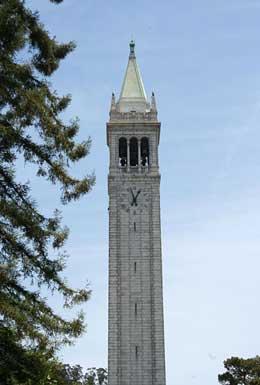 The bell tolls for thee: Berkeley's campanile overlooks a university beset by budget woes.Wikimedia Commons
The bell tolls for thee: Berkeley's campanile overlooks a university beset by budget woes.Wikimedia CommonsCalifornia's universities are reeling from unprecedented budget cuts that have been triggered by the state's financial crisis.
The ten-campus University of California expects to see a cut of US$800 million from the $3.2 billion in state funds it was due to receive over the next year. And with 23 campuses that provide mainly undergraduate degrees, the California State University system anticipates that at least $580 million will be sliced from its $2.7-billion state award.
The full weight of the budgetary axe began taking its toll after voters in last month's state-wide election rejected a series of proposals designed to ease California's budget deficit of more than $24 billion.
California governor Arnold Schwarzenegger and the state legislature are now making a series of adjustments to the state's budget before the current fiscal year ends on 30 June. In an effort to control academic spending, some state legislators have proposed stripping the University of California of its constitutional autonomy, placing it directly under the control of elected legislators — a move that university officials say they will fight to the end.
In preparation for what is expected to be a turbulent summer, executives of the University of California met at its headquarters in Oakland on 3 June to discuss how they will cope with the cuts.
Various campuses have already halted building projects, aborted recruitment efforts and reduced student enrolments. The University of California system has raised tuition fees for its 225,000 students by 9.3%, and the California State system, which has almost 450,000 students, is bracing for a reduction of 40,000 students over the coming year. The timing could not be worse — as the economic downturn has driven the US national unemployment rate up to 9.4%, many people are turning to education as an alternative.
 Read more at the Recession Watch special
Read more at the Recession Watch specialEven initiatives with broad political backing are now caught in the economic vice. For example, the still-unfinished University of California (UC) Merced campus in the San Joaquin Valley — whose first class graduated last month — is facing a total cut in infrastructure funding, along with a potential reduction in the number of its students that attract state funding. "This is like building a house in a hurricane," says neuroscientist Keith Alley, Merced's provost.
Completion of a second science and engineering building at UC Merced has been delayed from 2012 to 2015, and the cash needed to continue enrolling students has been maintained by tapping other campus budgets. "We expect to be OK on enrolment funds for now," says Alley, "but we know nothing about 2010."
At UC Riverside, hopes are evaporating for a new medical school that intended to receive its first class in 2012. The campus has already halted projects totalling $185 million — including a genomics facility that has been built but cannot be furnished. The university says that it needs about $10 million from the state by September if it is to proceed with the medical school's recruitment drive. Although winning the extra cash seems unlikely, campus officials will not say whether they have plans to delay the school's opening.
At the UC campuses in San Francisco, San Diego, Davis and Irvine — known for their biomedical research — the paring knife is either at work or being sharpened. UC Irvine has already instituted a hiring freeze, officials say, and UC San Diego has eliminated 5% of the staff, or about 800 positions, in the past few months.
ADVERTISEMENT
Eric Vermillion, associate vice-chancellor for finance at UC San Francisco (UCSF), says that although they are still assessing where to make cuts, "the impact is going to be very severe".
The true scale of that impact should become apparent on 14 July at the next meeting of the UC Board of Regents. The meeting will be held at UCSF's new Mission Bay campus — where a $135-million cancer research building opened on 1 June.
